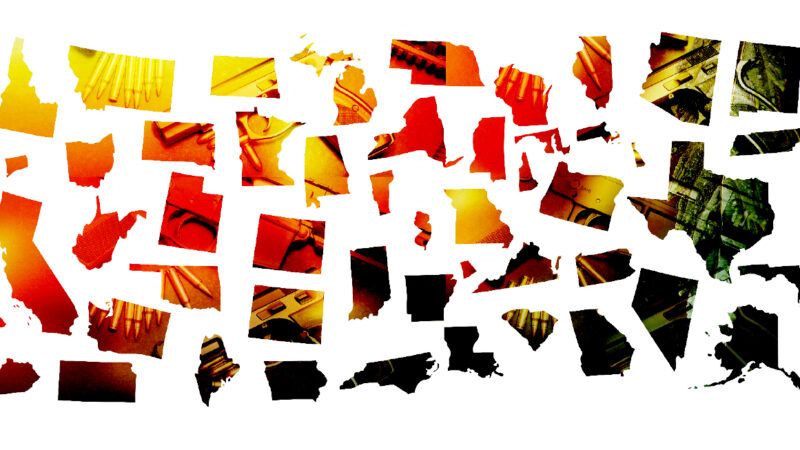State Legislators Want to Nullify Federal Gun Control
State legislators across the country are working to weaken the enforcement of federal gun laws by emulating immigration activists.

As President Joe Biden takes executive action to strengthen federal gun laws, state legislators across the country are working to weaken their enforcement by emulating immigration activists.
Since 1987, Oregon has prohibited law enforcement agencies from arresting or detaining people whose only crime was entering or living in the U.S. illegally. Hundreds of other jurisdictions have followed suit, becoming so-called sanctuary cities.
"The methods that we need to use are the ones already being used by the left," says Anthony Sabatini, a Republican member of the Florida House of Representatives. "Nullifying unconstitutional federal laws is both legal and the right thing to do."
Sabatini is co-sponsoring a Florida bill that would bar state employees from enforcing or attempting to enforce any of several listed federal gun controls, including taxes, registrations, bans, and more. State employees who violate that prohibition would be permanently barred from working for Florida's government.
In April, Republican governors in Arizona, West Virginia, and Montana signed similar bills into law, while Arkansas' governor, also a Republican, vetoed a bill. Such measures have passed in the Alabama Senate, the Missouri House, and the South Carolina House as well as legislative committees in Texas, New Hampshire, and Louisiana. Bills also have been introduced in North Carolina, Georgia, Minnesota, Ohio, Nebraska, and Iowa.
Many states already defy federal law, through both immigration sanctuaries and marijuana legalization. "In terms of the method, it's identical," says Sabatini. Sanctuary cities have "stopped reporting to or dealing with [Immigration and Customs Enforcement], and that's basically what we're doing."
The legal case does not depend on the constitutionality of the law a state wants to nullify in this way. Under the anti-commandeering doctrine, a principle that has been upheld in five Supreme Court cases from 1842 to 2018, the federal government can't require state or local officials to participate in the enforcement of federal laws.
"We know this stuff has been working," says Michael Boldin, founder and executive director of the Tenth Amendment Center. "The right can continue to complain about the things that the left is successful at, or they can look at it, learn from it, and replicate it."
The right has been wary of embracing nullification, however. In March 2018, when the Trump administration was battling sanctuary cities, soon-to-be National Security Advisor John Bolton challenged the concept in an interview with Breitbart. "The idea that law enforcement at lower levels shouldn't be required to cooperate with the feds is just unthinkable," he said. "That was also proposed by South Carolina Sen. John C. Calhoun before the Civil War, to say that South Carolina and other slave states would not enforce federal law regarding slavery."
Boldin says that argument is ahistorical. The anti-commandeering doctrine originated in the 1842 Supreme Court case Prigg v. Pennsylvania, which upheld the Keystone State's right not to enforce the Fugitive Slave Act of 1793. "The bottom line is nullification (banning participation in federal enforcement) was actually a tool of the anti-slavery, abolitionist North," Boldin says. "And when South Carolina seceded…they issued a document to explain their rationale, specifically [citing] Northern nullification of the federal Fugitive Slave Act."
The most effective opponents of gun nullification bills have been law enforcement groups such as the sheriffs associations in Missouri and Arkansas, which have tried to render them toothless. Boldin thinks police departments want to continue enforcing federal law because it's lucrative, bringing in money from federal grants and civil asset forfeiture. "I don't think they'll admit that they're getting a bunch of loot to do this federal enforcement," he says, "but they certainly are."
The most effective way to oppose federal overreach is at the local level, Boldin argues. "The whole idea of federalism is so important, because it's the only way you can have a country with a few hundred million people with a wide range of social, economic, [and] political viewpoints living together in peace."
Nullification also can flow back upward. Now that 36 states have nullified federal marijuana prohibition by allowing medical or recreational use, Boldin argues, the federal government will soon have to follow suit. "I think we can replicate that on other issues," he says, "and learn that localism is really the way forward for liberty."


Show Comments (99)